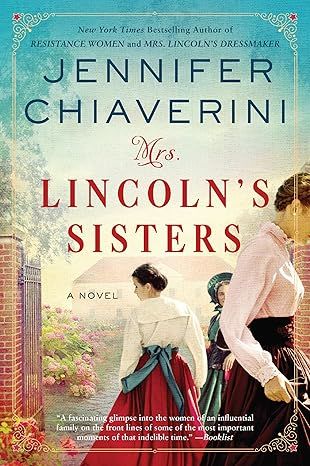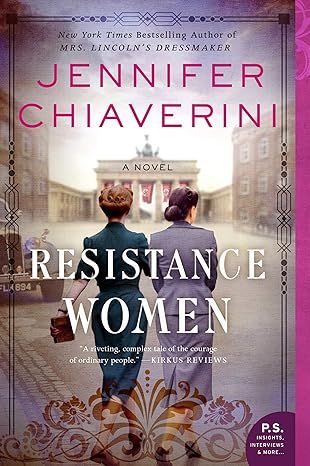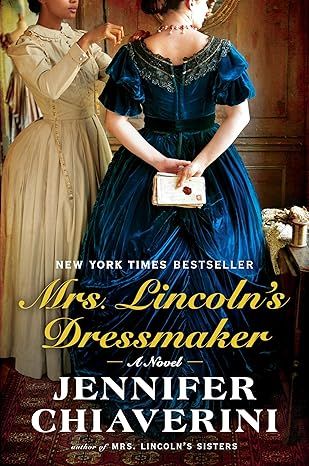Mrs. Lincoln's Sisters: A Novel
4.4
-
982 ratings
“A fascinating glimpse into the women of an influential family on the front lines of some of the most important moments of that indelible time."--Booklist
The New York Times bestselling author of Mrs. Lincoln’s Dressmaker returns to her most famous heroine, Mary Todd Lincoln, in this compelling story of love, loss, and sisterhood rich with history and suspense.
In May 1875, Elizabeth Todd Edwards reels from news that her younger sister Mary, former First Lady and widow of President Abraham Lincoln, has attempted suicide.
Mary’s shocking act followed legal proceedings arranged by her eldest and only surviving son that declared her legally insane. Although they have long been estranged, Elizabeth knows Mary’s tenuous mental health has deteriorated through decades of trauma and loss. Yet is her suicide attempt truly the impulse of a deranged mind, or the desperate act of a sane woman terrified to be committed to an asylum? And—if her sisters can put past grievances aside—is their love powerful enough to save her?
Maternal Elizabeth, peacemaker Frances, envious Ann, and much adored Emilie had always turned to one another in times of joy and heartache, first as children, and later as young wives and mothers. But when Civil War erupted, the conflict that divided a nation shattered their family. The Todd sisters’s fates were bound to their husbands’ choices as some joined the Lincoln administration, others the Confederate Army.
Now, though discord and tragedy have strained their bonds, Elizabeth knows they must come together as sisters to help Mary in her most desperate hour.
Kindle
$13.99
Available instantly
Audiobook
$0.00
with membership trial
Hardcover
$25.99
Paperback
$14.49
Ships from
Amazon.com
Payment
Secure transaction
ISBN-10
0062975986
ISBN-13
978-0062975980
Print length
368 pages
Language
English
Publisher
William Morrow Paperbacks
Publication date
June 28, 2021
Dimensions
5.31 x 0.83 x 8 inches
Item weight
2.31 pounds
Product details
ASIN :
B07XY6JTC9
File size :
4090 KB
Text-to-speech :
Enabled
Screen reader :
Supported
Enhanced typesetting :
Enabled
X-Ray :
Enabled
Word wise :
Enabled
Editorial reviews
"How did former first lady Mary Todd Lincoln fall from grace to incarceration at Bellevue Place?...Chiaverini builds a beliavable domestic sphere in which the women surrounding Mary--women who have also mourned the losses of husbands and children--try to puzzle out when she began to lose her sanity....An engaging glimpse of women's privilege and anguish during the Civil War era." -- Kirkus Reviews
“Chiaverini’s many fans, and every historical fiction reader who enjoys strong female characters, will find much to love in this revealing WWII novel.” -- Booklist on Resistance Women
“A riveting, complex tale of the courage of ordinary people.” -- Kirkus Reviews on Resistance Women
" Through meticulously researched historical detail and sympathetic portrayal of each character, including Mary herself, Chiaverini provides a fascinating glimpse into the women of an influential family on the front lines of some of the most important moments of that indelible time." -- Booklist
“Chiaverini offers an intimate and historically sound exploration of the years leading up to and through WWII . . . exceptionally insightful, making for a sweeping and memorable WWII novel.” -- Publishers Weekly on Resistance Women
Sample
1
May 1875
ELIZABETH
A whimsical breeze rustled the paper beneath Elizabeth’s pen as she wrote in the garden, but she held the sheet firmly against the table with her left hand and it was not carried aloft. She lifted her pen and waited for the gust to subside rather than risk smearing the ink, and in that momentary pause a light shower of blossoms from the plum tree fell upon her, the table, and the head of her sixteen-year-old grandson Lewis, sprawled in a chaise lounge nearby, so thoroughly engrossed in Jules Verne’s Around the World in Eighty Days that he did not notice the petals newly adorning his light brown hair. She smiled, tempted to rise and brush the blossoms softly to the ground with her fingertips, but he looked so charming that she decided to leave them be.
It was to Lewis’s mother she was writing—Julia, her eldest child and only daughter. Julia’s husband, Edward Lewis Baker Sr., had been appointed United States consul to Argentina the previous year, and when the couple moved to Buenos Aires, Lewis came to stay with his grandparents. Ninian and Elizabeth’s gracious home on Aristocracy Hill in Springfield had more than enough room for one much adored grandson, and they were delighted to take him while he finished his education, or indeed for as long as he wished.
The breeze subsided, leaving the delicate fragrance of hyacinth and narcissus in its wake, but before Elizabeth could again put pen to paper, the dull, chronic ache in her abdomen suddenly sharpened. She must have gasped aloud, for Lewis glanced up from his book. “Are you all right?” he asked, brow furrowing.
She managed a smile. “Perfectly fine, dear. I’m merely . . .” She inhaled deeply, ignoring the stab of pain, and forced a sigh of contentment. “Enjoying the lovely spring air.”
He peered at her inquisitively, unconvinced. “Are you sure? Would you like me to have Mrs. Henderson or Carrie fix you a cup of tea?”
“I have one,” she replied, gesturing to the cup on the table. A pale lavender petal floated upon the surface of the amber liquid, which was not proper tea but a tincture of ginger, willow bark, and raspberry leaf prepared for her by an elderly woman of color respected throughout the city for her knowledge of herb lore. No one but Elizabeth and her loyal housekeeper knew that she partook of the remedy almost every day, sometimes twice, morning and night. Although the brew temporarily relieved her symptoms and evidently did her no harm, she knew that Ninian and her sister Frances would chide her for wasting money on flavored water when her doctor had assured her that the aches and pains were all in her head.
At the time, knowing that a sharp rebuke would merely confirm for the doctor the accuracy of his diagnosis, Elizabeth had managed, with great effort, to nod politely and thank him. Although she had agreed to avoid strenuous activity, she had declined the laudanum he recommended. Only later, when she and Frances were alone, had she said what she truly thought. “And the droplets of blood on my undergarments, are they all in my head too?” she had demanded indignantly, albeit in an undertone, lest anyone overhear and be shocked by her impolite language.
Frances herself had looked somewhat shocked, but her late husband had been a doctor as well as a storekeeper, and she had probably heard far worse. She had assured Elizabeth that her pains and aches and blood were merely symptoms of the change of life, something all women must endure, and in time they would subside. Elizabeth hoped her sister was right, but feared she was not. At sixty-two, Elizabeth had passed through the change several years before, or so she had thought. This felt like something else, but if her doctor, her husband, and her closest sister said it was nothing, who was she to question them?
The pain faded back to a faint, dull ache. Setting down the pen and taking up her spoon, Elizabeth fished the plum petal from her teacup, set it on the saucer, and sipped the herb woman’s brew. Even if unusually flavored, it was rather tasty, and made all the better with a spoonful of honey stirred in. The concoction did her no harm, she reminded herself, so no one else need know of it. If ever the time came when it failed to ease her pains, she would insist upon seeing another doctor. As she set down her cup, the back door opened and Carrie emerged, small and fair in her gray dress and white apron and cap. “Mrs. Edwards, ma’am,” she said, bobbing a curtsy, “there’s a gentleman at the door who says he must speak with you most urgently.”
Elizabeth was not expecting any callers. “Did he give you his card?”
“No card, but his name is Mr. Smith. Not your Mr. Smith,” the maid added quickly, referring to another of Elizabeth’s brothers-in-law, her sister Ann’s husband. “I would have shown him in.”
“Of course.” Puzzled, Elizabeth rose. “I can’t think of any urgent business I have with any Mr. Smith, or with any gentleman, for that matter.”
“Do you want me to see to it?” Lewis swung his coltishly long legs over the edge of the chaise lounge and prepared to stand. “I can direct him to Grandfather’s office or send him on his way, whatever seems best.”
Elizabeth smiled indulgently, gestured for him to stay seated, and gave in to the impulse to brush the flower petals from his hair. “Thank you, dear, but I believe I can manage.”
She accompanied Carrie back inside and through the house to the front entrance, where she found a slim fellow perhaps a decade older than her grandson standing on the doorstep, clutching his hat, and surreptitiously trying to peer through the front windows. Dismissing Carrie, she smoothed her skirts and opened the door. He brightened at the sight of her, and in the customary exchange of pleasantries that followed, he identified himself as Mr. Philip Smith of Elkhart. The unfamiliar name revealed absolutely nothing about his purpose in wanting to speak to her—and that, coupled with his keen gaze and palpable eagerness, made her instinctively wary.
“I regret that I cannot invite you in,” she said. “Mr. Edwards is not at home presently, and I assume your business is with him. Perhaps if you leave your card—”
“Oh, no, I’m here to see you,” the man interrupted, nodding for emphasis. “I must say, madam, I’m pleased to see you looking so well under the circumstances.”
Her heart thudded. “Circumstances?” Her thoughts flew to Julia and Edward in far-off South America, to her beloved Ninian a few blocks away. “I don’t understand.”
“Surely you do.” His gaze turned disbelieving, impudent. “You are Mrs. Lincoln’s sister, aren’t you?”
Of course. Why else would a stranger turn up uninvited at her door if not for Mary? Morbid curiosity-seekers did not plague the family as frequently as they once had, ten years after her brother-in-law’s horrific assassination, but every so often a snake slithered out from beneath a rock. “I am one of her sisters,” Elizabeth acknowledged, bristling. “I beg your pardon, but I was not expecting callers, and I must—”
“I won’t need more than a moment of your time.” He stepped forward as if he meant to block the door with his foot before she could close it. “Would you care to make a statement about Mrs. Lincoln’s sad misfortune?”
“A statement?” Which misfortune? There were so many from which to choose, not that Elizabeth would know of any recent mishaps, not that she would ever confide in a random stranger who appeared on her doorstep without so much as a— Then she understood. “You’re with the press,” she said, drawing herself up and fixing him with a withering look.
“Yes, as I said, Philip Smith, Elkhart Gazette.”
“You most certainly did not say.” Grasping the doorknob, she said, “You have no honor, sir, but if you leave now, I won’t summon the police and have you charged with harassment and trespassing. Good day.”
She shut the door firmly and slid the bolt in place, heart pounding, mouth dry. Mr. Smith rang the bell and called her name as she shrank back into the foyer, bewildered and upset. Her family had been tormented by vile stories in the papers through the years, but rarely had a reporter violated the sanctity of their home or sought out Elizabeth in particular. How dare a reporter approach her now? She was a private citizen, not a politician who had deliberately chosen a public life. How could anyone think her so devoid of compassion and loyalty that she would conspire to dredge up ugly incidents from Mary’s past? An estranged sister was a sister yet.
Unless—
Perhaps Mr. Smith was not looking into Mary’s past but her present.
Elizabeth forced herself to take a deep breath, to think clearly, to remember precisely what he had said. He wanted a statement, not Elizabeth’s reflections upon her sister’s history but her reaction to some new incident. She pressed a hand to her forehead. Oh, Mary. What new scandal had she become entangled in, to the embarrassment and mortification of her family?
Whatever had compelled that reporter to visit Springfield, it was something so dreadful that he had expected to find Elizabeth in distress, and so significant that he assumed she already knew of it. And yet he had found her utterly unaware. How could this be? How had Mr. Smith outpaced the telegraph?
Unsettled, she went to the dining room in search of the morning newspapers, which her husband always read over breakfast. Elizabeth had slept poorly the night before, owing to the ache in her abdomen, and by the time she had risen and dressed, Ninian had already left for work. She did not remember seeing the papers folded on the table in front of his empty chair, and they were not there now. She went next to his study, but the papers were not on his broad mahogany desk. Nor were they in the library, where the tall bookshelves were neatly filled with law books and works of history and natural science, as well as a few popular novels and volumes of poetry. Nary a scrap of newsprint caught her eye.
She went to the parlor and rang for Mrs. Henderson, who had just returned from the market. The housekeeper confirmed that the papers had been delivered that morning as usual, and that she herself had glimpsed Mr. Edwards reading them at the breakfast table. She was as mystified as Elizabeth regarding their apparent disappearance, but she offered to search for them. In the meantime, Elizabeth returned to the garden to ask Lewis if he had any idea what had become of the papers. He had not seen them that morning either, nor had he spoken to his grandfather except to exchange hasty greetings as Ninian departed the house in a rush.
“Has something happened?” asked Lewis, setting his book aside and rising.
Before Elizabeth could reply, Mrs. Henderson emerged from the house steering a reluctant Carrie along by the elbow. Bringing the maid to a halt before them, she fixed the girl with a stern look. “Tell the missus what you told me.”
Eyes downcast, the maid meekly said, “Mr. Edwards told me to burn the papers.”
“What?” exclaimed Elizabeth. “And yet you watched me search the house for them and said nothing?”
“I’m sorry, ma’am. Mr. Edwards said to keep mum about it.”
“Oh, for heaven’s sake.” Elizabeth felt a pang of distress. “Did he say why he wanted you to burn the papers?”
The young maid pressed her lips together and shook her head, but the only explanation was that there was something in the papers Ninian did not want her to see.
As Mrs. Henderson warned Carrie that they would have a serious discussion later about the consequences of keeping secrets from the missus, Elizabeth sent Lewis out to buy replacement papers. She paced in the garden as she waited, torn between annoyance with Ninian and apprehension for the dreadful news he had tried to conceal from her.
When Lewis returned, she knew from his stricken expression that he had paused to scan the front pages on the way home. “What is it?” she asked, a tremor in her voice. “What has my sister done?”
Lewis said nothing, but merely shook his head and held out the stack of papers. She took the Chicago Tribune from the top, unfolded it—and froze, breathless, when the familiar name leapt out at her in bold headlines.
Read more
About the authors
Jennifer Chiaverini
Jennifer Chiaverini is the New York Times bestselling author of FATES AND TRAITORS, MRS. LINCOLN'S DRESSMAKER, MRS. LINCOLN'S RIVAL, THE SPYMISTRESS, MRS. GRANT AND MADAME JULE, and other acclaimed historical novels. She also wrote the beloved Elm Creek Quilts series, as well as six collections of quilt patterns inspired by her books. A graduate of the University of Notre Dame and the University of Chicago, she lives with her husband and two sons in Madison, Wisconsin. About her historical fiction, the Milwaukee Journal Sentinel writes, "In addition to simply being fascinating stories, these novels go a long way in capturing the texture of life for women, rich and poor, black and white, in those perilous years."
Read more
Reviews
Customer reviews
4.4 out of 5
982 global ratings
Georgia Larson
5
I love Chiaverinni books.
Reviewed in the United States on August 19, 2022
Verified Purchase
I read all but a couple of her most recent books. I highly recommend her quilt stories. This particular book jumped from Mary Lincoln’s upbringing to during & after her stay in the White House. It depicts her but wasn’t fond of the jumping back & forth. I do however recommend it.
2 people found this helpful
Amazon Customer
5
Mental illness
Reviewed in the United States on February 16, 2024
Verified Purchase
A great peak into mental illness and how one can be propelled by such!
2 people found this helpful
CRS
5
Enjoyed enjoyed reading about the family dynamics of the Todd sisters
Reviewed in the United States on May 27, 2022
Verified Purchase
History has not been kind to Mary Todd Lincoln and this book fleshes out a woman who has been somewhat misunderstood. I learned many new things about her background and the family dynamics among her and sisters relationships. Mary Todd Lincoln was a human being with good qualities and bad, endured terrible tragedies but she was lucky in that she had sisters who loved and stood by her and did their best even during her darkest hours.
Read more
3 people found this helpful
Top Jennifer Chiaverini titles
View allSimilar Books
Best sellers
View all
The Tuscan Child
4.2
-
100,022
$8.39

The Thursday Murder Club: A Novel (A Thursday Murder Club Mystery)
4.3
-
155,575
$6.33

Sapiens: A Brief History of Humankind
4.6
-
140,302
$13.49

The Butterfly Garden (The Collector, 1)
4.3
-
88,556
$9.59

Things We Hide from the Light (Knockemout Series, 2)
4.4
-
94,890
$11.66

The Last Thing He Told Me: A Novel
4.3
-
154,085
$2.99

The Perfect Marriage: A Completely Gripping Psychological Suspense
4.3
-
143,196
$9.47

The Coworker
4.1
-
80,003
$13.48

First Lie Wins: A Novel (Random House Large Print)
4.3
-
54,062
$14.99

Mile High (Windy City Series Book 1)
4.4
-
59,745
$16.19

Layla
4.2
-
107,613
$8.99

The Locked Door
4.4
-
94,673
$8.53









